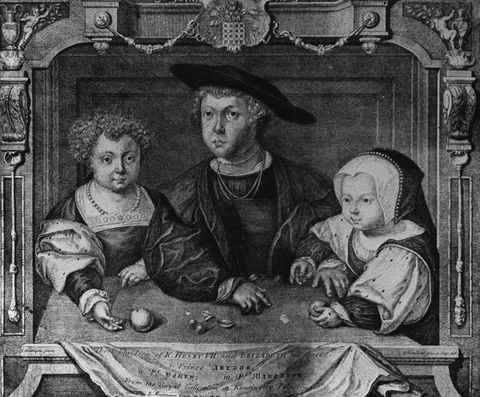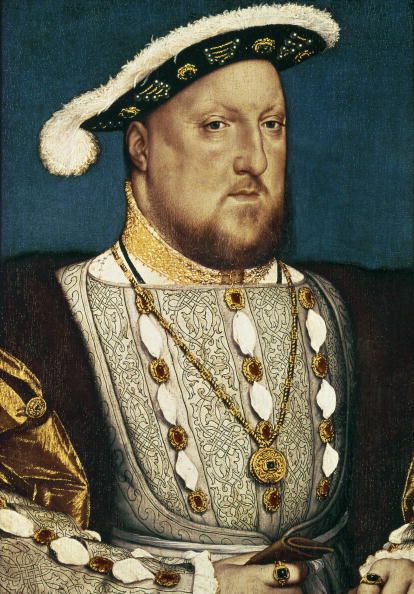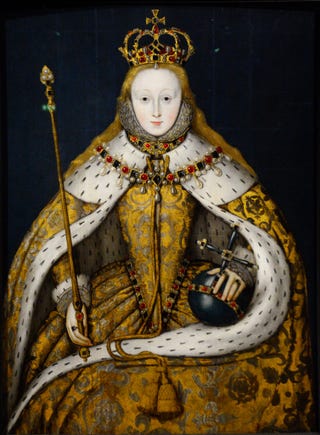King Arthur Son of Henry Vii Family Tree
Arthur Tudor is oft overshadowed past his more famous younger brother, Henry VIII. While Henry Viii'south dominion would marker a catamenia of massive change and historical intrigue—his six wives; his carve up from the papacy and the beginning of the English Reformation; his two reigning daughters—Arthur remains famous predominately because of his decease.
And yet, information technology is only because of Arthur'south premature passing that Henry 8 even became king in the kickoff place. Indeed, by virtue of his death Arthur might well have become i of the most influential figures of English language history you've never heard of.
Who was Arthur, Prince of Wales?
Born in Winchester Castle in September 1486—a scant nine months after his parent's marriage—Arthur was the eldest of King Henry Vii'due south four surviving children with Elizabeth of York. Named subsequently the legendary king of Camelot, Arthur was engaged as a toddler to Catherine of Aragon, the youngest daughter of King Ferdinand II of Aragon and Isabella I of Castile, in society to create an alliance between England and Spain.
Though it would take several years to secure papal approving for the match, the couple exchanged letters in Latin for some time and finally met not long before their marriage in a lavish celebration at St. Paul's Cathedral in London, in November of 1501.
The state of Arthur's lifelong health has been debated by scholars over the years, with some contradictory evidence on both sides suggesting he may have been sickly as a child, or alternately, perfectly healthy and robust. Regardless of his childhood health, by the fourth dimension he married Catherine at the age of 15, turn down was not far off.
Though the couple was subjected to a bedding ceremony, in which the newlyweds were escorted to bed on their wedding ceremony dark by members of the court and were seen to lay down together, Catherine would later insist that the marriage was never consummated, evidently due to to Arthur'southward infirmity. It was this purported lack of consummation that would ultimately lead to the blessing for Catherine to ally Arthur'due south blood brother, Henry VIII; doubts over the story would play a significant role in kicking off the English Reformation.
After their wedding, Arthur and Catherine set up their household in Ludlow Castle, on the Welsh edge. They lived there together for several months before, in the spring of 1502 both were taken sick with a well-known malady of the time, "sweating sickness." Catherine recovered from the illness; Arthur died of it on April 2, 1502 later on a mere 5 months of marriage.
The English language Sweat
Also known as the sweating sickness and but the sweats, the and so-called "English Sweat" which claimed Arthur, Price of Wales's life has remained a medical mystery for centuries.
Reaching epidemic proportions on no less than v occasions during the late 15th and early 16th centuries, sweating sickness was highly lethal. Physician John Caius, whose book virtually the illness remains the near famous account from the time period, noted that decease could occur within 3 hours of the onset of symptoms, and that those who survived the start 24 hours would usually make a full recovery (though surviving did not, evidently, prevent the patients from contracting the disease once again.)
Sweating sickness was confined nearly exclusively to England during its outbreaks, ravaging the wealthy more than frequently than the poor. And notwithstanding, for all of its virulence, the sweats seemed to disappear most as suddenly as they appeared in the first place, with no known outbreaks after 1578.
While the disease'south disappearance no doubt saved thousands of lives, it has besides stymied modern medical investigators hoping to understand what claimed the life of Arthur so many of his subjects.
Office of the trouble stems from sweating sickness's symptoms—fever, chills, aches, delirium, and, of form, intense sweating—which are common to a number of diseases including influenza, scarlet fever, and typhus, withal never seem to fit exactly in strength, duration, or combination with any known medical issue. The most mutual modern theory suggests that the outbreaks may take been a grade of hantavirus, like to a hantavirus pulmonary syndrome that struck the American southwest in the 1990s. Exactly why the virus, if that was indeed the crusade, would disappear so suddenly is not known, just some scholars suggest that it could be a upshot of the virus evolving in a mode that made it less deadly or less hands spread to humans.
Why was Arthur and so important?
Henry VII spent much of his reign planning out how to maintain the Tudor dynasty'southward concur on the throne; a goal in which Arthur played a pivotal role.
Not a wildly popular king, Henry Seven did not win the throne until he was in his late 20s, having spent much of his life in French republic in an effort to protect him from Yorkish forces. Henry VII's claim to the throne was besides debated, coming downwardly through his mother'south side of the family. Nonetheless, by his late 20s, Henry VII had found himself the about viable of the potential heirs on the Lancastrian side of the State of war of the Roses and after defeating Richard III at the Battle of Bosworth Field in 1485, he rose to the throne.
With the crown in place, Henry 7 hoped to seal his concur over England by uniting his house with that of his enemies from the war, the Business firm of York. To exercise so, he married Elizabeth of York, the eldest kid of King Edward Iv, as seen in The White Princess .
As the heir of both the Firm of Tudor and the House of York, Arthur was a keystone in Henry VII's plan to forbid rival factions from rising against his merits to the throne and maintaining peace in the kingdom. Upon his expiry, that curtain fell to Henry VII and Elizabeth'south only remaining son, the future King Henry 8.
How did Arthur's decease change history?
Henry 8's rule had a dramatic and long-lasting touch on on European history, in large part because of his years-long quest to create a male person Tudor heir to follow him on the throne. He began by marrying Catherine of Aragon, Arthur's widow; a wedlock which was only allowed by the Catholic church when Catherine testified that she had never slept with Arthur.
While Henry 8 and Catherine were reportedly happy for many years, the absence of a male heir weighed heavily on Henry VIII, who realized that in failing to provide a straight male heir he might plunge the country into another civil state of war upon his expiry. He began to believe that Catherine might in fact accept consummated her marriage to his blood brother and that their inability to have a surviving son together was God'south penalisation. Along with his infatuation with Anne Boleyn, it inspired Henry 8 to petition the church building for a divorce. When the church refused, the irate Henry Eight set about breaking the country away from Catholicism, ultimately forming the Church building of England to grant his own divorce from Catherine.
If Arthur had non died when he did, he might well accept left a male heir of his own, circumventing Henry VIII'due south claim to the crown. Had he died even a yr later, it might have been more difficult for Catherine to fence her virginity, preventing her marriage to Henry VIII and ultimately, perchance, even the germination of the Church of England.
Likewise, it'southward unlikely that if Arthur had lived, the world would ever have seen the rule of Queen Elizabeth I, the daughter of Henry Viii and Anne Boleyn. Nor would, upon Elizabeth I's death, James I accept ascended the throne, functionally combining the royal houses of Scotland and England under a unmarried crown.
However, information technology wasn't simply in problems of politics and religion that Arthur'south death influenced Henry VIII'southward impact on the world; it also may have changed medical history.
The death of Arthur deeply psychologically effected Henry VIII; he became obsessed with medical science in his adulthood, developing his own treatments and tinctures that he believed would help keep him healthy and free of the clutches of the dreaded sweating sickness. It was this interest that as well led Henry to endow the first medical college in England, the Royal Higher of Physicians (and then known as the King's Higher of Physicians), which established standards of care and training in the previously unregulated medical field. In doing and then, he likely impacted not only the development of medical treatments throughout England, but besides the rest of Europe when English-trained doctors good abroad.
This content is created and maintained by a third party, and imported onto this folio to help users provide their e-mail addresses. You may be able to find more than information about this and like content at piano.io
Source: https://www.townandcountrymag.com/society/tradition/a27258498/prince-arthur-tudor-death/






0 Response to "King Arthur Son of Henry Vii Family Tree"
Post a Comment